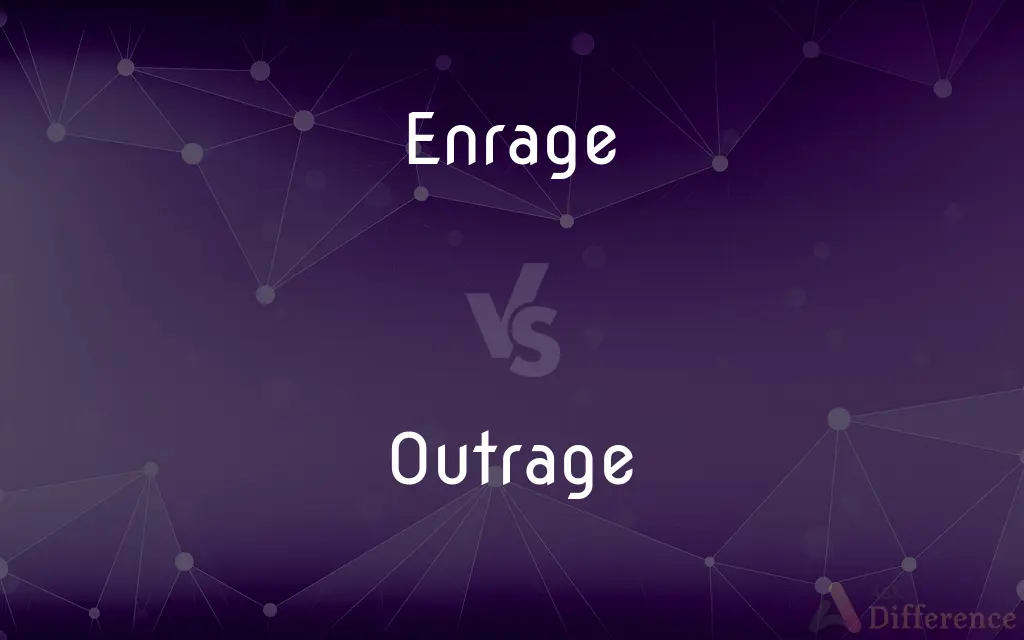Enrage vs. Outrage — What's the Difference?
Edited by Tayyaba Rehman — By Maham Liaqat — Updated on May 2, 2024
Enrage implies triggering intense anger internally, while outrage involves a profound reaction to extreme injustice or offense.

Difference Between Enrage and Outrage
Table of Contents
ADVERTISEMENT
Key Differences
Enrage is used to describe the act of provoking severe anger or fury in someone, typically in a personal or direct manner. Outrage, on the other hand, refers to a strong emotional response of shock, indignation, or anger typically caused by something perceived as unjust, offensive, or insulting.
Enrage often pertains to personal feelings of anger stirred within an individual or group, focusing on the emotional impact. Whereas outrage encompasses a broader social or moral reaction, highlighting a collective response to a situation or event.
Enrage can be triggered by personal attacks or direct provocations that affect an individual deeply. On the other hand, outrage is generally sparked by public or societal issues that resonate with broader ethical or moral standards.
Enrage typically results in a more intense, sometimes violent emotional response aimed at a specific cause or individual. While outrage often leads to public demonstrations, calls for justice, or social media activism, reflecting a communal call to action.
Enrage is often used in contexts involving personal relationships or close interactions, where emotions can be easily inflamed. Outrage, however, is used in scenarios involving public figures, governmental actions, or large corporations, where actions impact a wide array of people.
ADVERTISEMENT
Enrage is a verb that describes the process of becoming extremely angry, often quickly and intensely. Outrage serves both as a noun and a verb, describing not only the act of offending or angering but also the state of being offended or angered.
Comparison Chart
Definition
To provoke intense anger.
To shock or deeply offend.
Usage as Part of Speech
Primarily used as a verb.
Used as both a noun and a verb.
Emotional Intensity
Highly personal and intense.
Broad and involving a public or moral component.
Typical Context
Personal interactions or direct provocations.
Social, ethical, or public issues.
Reaction Type
Personal and sometimes violent.
Often public and involves activism or protest.
Compare with Definitions
Enrage
To incite furious anger.
The unfair decision did nothing but enrage the players.
Outrage
An act that grossly offends decency or morality.
The corruption scandal was an outrage to the community.
Enrage
To provoke to a high degree of anger.
The constant noise from the construction site would enrage anyone.
Outrage
To shock or cause indignation.
The biased media coverage outraged the public.
Enrage
To inflame with wrath.
His dismissive comments were sure to enrage his colleagues.
Outrage
Extreme anger caused by an unjust, wrongful, or barbaric act.
They expressed their outrage at the policy change.
Enrage
To make extremely angry.
She was enraged by the unjust accusation.
Outrage
A powerful feeling of resentment or anger aroused by something perceived as an injury, insult, or injustice.
She felt outrage at the lack of support from her friends.
Enrage
To stir up or animate to anger.
The contentious debate continued to enrage participants.
Outrage
To violate or offend grossly.
The vandal’s actions outraged the entire neighborhood.
Enrage
To put into a rage; infuriate.
Outrage
An act of extreme violence or viciousness
Outrages committed by the dictatorship.
Enrage
To become angry or wild. 18
Outrage
Something that is grossly offensive to decency, morality, or good taste
Viewed the film as an outrage to common decency.
Enrage
(transitive) To fill with rage; to provoke to frenzy; to make furious.
Outrage
Resentful anger aroused by a violent or offensive act, or an instance of this
The incident sparked a public outrage.
Enrage
To provoke to madness, to make insane.
Outrage
To offend grossly against (standards of decency or morality); commit an outrage on.
Enrage
To fill with rage; to provoke to frenzy or madness; to make furious.
Outrage
To produce anger or resentment in
Was outraged that he was lied to.
Enrage
Put into a rage; make violently angry
Outrage
An excessively violent or vicious attack; an atrocity.
Outrage
An offensive, immoral or indecent act.
Outrage
The resentful, indignant, or shocked anger aroused by such acts.
Outrage
(obsolete) A destructive rampage. en
Outrage
(transitive) To cause or commit an outrage upon; to treat with violence or abuse.
Outrage
(transitive) To inspire feelings of outrage in.
The senator's comments outraged the community.
Outrage
To rage in excess of.
Outrage
To rage in excess of.
Outrage
To commit outrage upon; to subject to outrage; to treat with violence or excessive abuse.
Base and insolent minds outrage men when they have hope of doing it without a return.
This interview outrages all decency.
Outrage
Specifically, to violate; to commit an indecent assault upon (a female).
Outrage
To cause to become very angry; as, the burning of the flag outraged the small conservative town.
Outrage
To be guilty of an outrage; to act outrageously.
Outrage
Injurious violence or wanton wrong done to persons or things; a gross violation of right or decency; excessive abuse; wanton mischief; gross injury.
He wrought great outrages, wasting all the country.
Outrage
Excess; luxury.
Outrage
A feeling of righteous anger
Outrage
A wantonly cruel act
Outrage
A disgraceful event
Outrage
The act of scandalizing
Outrage
Strike with disgust or revulsion;
The scandalous behavior of this married woman shocked her friends
Outrage
Violate the sacred character of a place or language;
Desecrate a cemetary
Violate the sanctity of the church
Profane the name of God
Common Curiosities
What type of response does "outrage" typically lead to?
Outrage usually leads to public outcry, protests, or other forms of collective action.
How do "enrage" and "outrage" differ in usage?
Enrage is used regarding personal anger, while outrage often involves a broader community or public response.
How are "enrage" and "outrage" expressed differently in protests?
Enrage may lead to more personal expressions of anger, while outrage tends to drive organized social or political movements.
Can a person feel both enraged and outraged by the same event?
Yes, it's possible for an individual to feel both personal anger (enraged) and moral indignation (outraged) about an event.
What is the main emotion associated with "enrage"?
Enrage is primarily associated with intense and personal anger.
What types of situations typically enrage individuals?
Personal attacks, unfair treatment, or direct provocations are typical situations that enrage individuals.
Can "outrage" refer to both the feeling and the action?
Yes, outrage can refer to both the emotional state of being offended and the act that causes such a reaction.
What typically outrages communities?
Actions perceived as unjust, like political corruption or discriminatory policies, commonly outrage communities.
How do personal values affect feelings of outrage?
Personal values strongly influence what an individual finds outrageous, as these feelings are tied to morals and ethics.
Is "enrage" more intense than "outrage"?
Enrage usually denotes a more personal and intense emotional reaction compared to the often broader scope of outrage.
How does society typically respond to an outrage?
Society often responds to outrage with calls for justice, policy changes, or widespread protests.
What is the role of social media in expressing outrage?
Social media plays a significant role in amplifying and spreading feelings of outrage across larger communities.
Are "enrage" and "outrage" interchangeable in everyday language?
While they both relate to anger, they are not interchangeable due to their differing contexts and intensities.
Can media coverage enrage or outrage the public?
Yes, biased or unfair media coverage can both enrage individuals and outrage the public.
How does "enrage" affect personal relationships?
Enrage can lead to conflicts and intense disputes in personal relationships.
Share Your Discovery

Previous Comparison
Reticule vs. Reticle
Next Comparison
Fraction vs. RatioAuthor Spotlight
Written by
Maham LiaqatEdited by
Tayyaba RehmanTayyaba Rehman is a distinguished writer, currently serving as a primary contributor to askdifference.com. As a researcher in semantics and etymology, Tayyaba's passion for the complexity of languages and their distinctions has found a perfect home on the platform. Tayyaba delves into the intricacies of language, distinguishing between commonly confused words and phrases, thereby providing clarity for readers worldwide.
















































